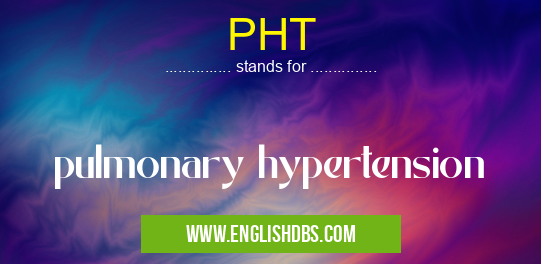What does PHT mean in HEALTHCARE
Pulmonary hypertension (PHT) is a condition characterized by abnormally high blood pressure in the arteries of the lungs. This can lead to various health complications, as the increased pressure can damage the heart and lungs.

PHT meaning in Healthcare in Medical
PHT mostly used in an acronym Healthcare in Category Medical that means pulmonary hypertension
Shorthand: PHT,
Full Form: pulmonary hypertension
For more information of "pulmonary hypertension", see the section below.
» Medical » Healthcare
What is Pulmonary Hypertension (PHT)?
PHT occurs when the pressure in the pulmonary arteries, which carry blood from the heart to the lungs, becomes abnormally high. This can be caused by various factors, such as:
- Blockages in the pulmonary arteries
- Narrowing or stiffening of the pulmonary arteries
- Heart conditions, such as left-sided heart failure or congenital heart defects
Symptoms of PHT
- Shortness of breath, especially with exertion
- Chest pain
- Fatigue
- Dizziness or fainting
- Swelling in the feet, ankles, or abdomen
Diagnosis of PHT
Diagnosing PHT involves a combination of physical examination, medical history, and specific tests, including:
- Chest X-ray
- Electrocardiogram (ECG)
- Echocardiogram
- Right heart catheterization
Treatment for PHT
Treatment options for PHT depend on the underlying cause and severity of the condition. They may include:
- Medications to lower pulmonary artery pressure
- Oxygen therapy
- Surgery or other interventions to correct blockages or defects
Essential Questions and Answers on pulmonary hypertension in "MEDICAL»HEALTHCARE"
What is pulmonary hypertension (PHT)?
PHT is a condition in which the blood pressure in the arteries of the lungs is abnormally high. This can make it harder for the heart to pump blood through the lungs, and can lead to serious health problems.
What are the symptoms of PHT?
Symptoms of PHT can include shortness of breath, chest pain, fatigue, and dizziness. In severe cases, PHT can lead to heart failure and death.
What causes PHT?
There are many different causes of PHT, including:
- Heart disease
- Lung disease
- Blood clots
- Certain medications
- Genetic disorders
How is PHT diagnosed?
PHT is diagnosed with a variety of tests, including:
- Physical exam
- Blood tests
- Chest X-ray
- Echocardiogram
- Right heart catheterization
How is PHT treated?
Treatment for PHT depends on the underlying cause. Treatment options may include:
- Medications
- Surgery
- Lifestyle changes
What is the outlook for people with PHT?
The outlook for people with PHT depends on the underlying cause and the severity of the disease. With proper treatment, many people with PHT can live long and healthy lives.
Final Words: PHT is a condition that requires prompt diagnosis and treatment to prevent serious health complications. By understanding the causes, symptoms, and treatment options associated with PHT, individuals can take proactive measures to manage their condition and improve their overall health.
PHT also stands for: |
|
| All stands for PHT |
